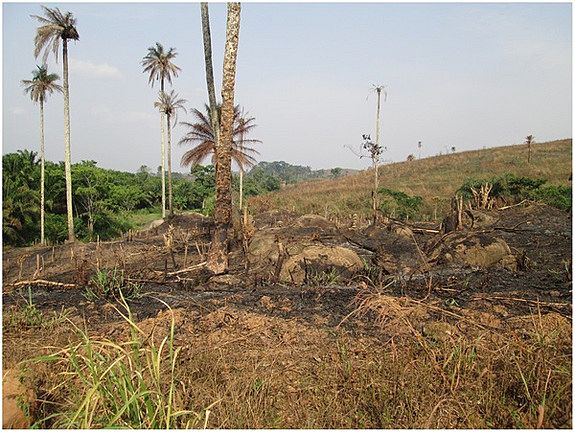One thing we haven’t heard about Ebola is how this outbreak started, but it looks like another case of unintended consequences of humans versus nature.
Apparently, the outbreak began last December in Meliandou, a small village in the "Forest Region" of southern Guinea, where a few hundred people live. While the modern world is edging its way in, it’s still the kind of place that has thatch-roofed shacks, dirt paths and freely wandering chickens and goats.
The people have long lived on abundant meat from the forest – monkeys, antelope, squirrels and the like – but during the civil wars in Liberia and Sierra Leone, refugees poured into Guinea swelling the population. That’s when rampant logging began to make way for farms, charcoal and construction. Mining companies were close behind taking advantage of deforestation.
"As the forests disappeared, so too did the buffer separating humans from animals – and from the pathogens that animals harbor," says Vanity Fair.

The Ebola virus probably arrived in the village via a fruit bat, according to scientists, which carry the virus. Mining and clear-cutting have left bats without habitat, bringing them closer to people, attracted to palm and mango they grow.
After that the details are fuzzy, but a 2-year-old boy got infected with the virus and died four days later, quickly spreading it to family members. Humans may have shot a bat for food and some of its blood got on the child as his mother prepared the bat for dinner. Or maybe the child ate a piece of infected fruit.
"The bottom line is that there is no public health without environmental health," says The Guardian. "Deforestation didn’t cause this Ebola epidemic, but did make it much more likely." The region’s legacy of war and poverty, its beleaguered health care systems, and a series of bureaucratic fumbles fanned a small and isolated outbreak into a full-blown epidemic fire."
They continue:
"Even as global efforts intensify to quash the outbreak in West Africa, let’s not lose sight of what we can learn in this most sobering of teachable moments: we must give environmental science a much larger and more powerful role in public health practices. If West Africa’s forests had been harvested in a more sustainable manner and its wildlife monitored for health, Ebola might not have jumped into the human population. At the very least, efforts to treat the sick and contain the outbreak might have been better targeted earlier in the game.
Pathogens such as the Ebola virus are opportunists. To understand their perils and possibilities, first we need to see the connections. There is a clear connection to conservation and wise stewardship of forests to many public health goods, from storing atmospheric carbon to soaking up heavy rains – to acting as barriers to disease."
Read about what’s happening in Liberia, one of the last strongholds of intact forest in West Africa:
